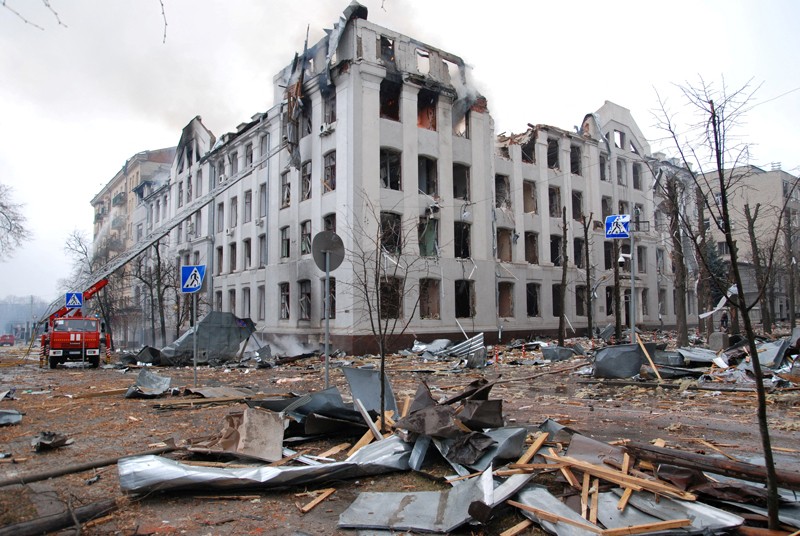“What will happen now is anybody’s guess. If Russia imposes regime change and installs a Kremlin-friendly government it would be a tragedy, because more young people would flee, and the chances of Ukraine really developing would be stymied” – George Gamota, a scientist in Ukraine

The Kharkiv National University building in Ukraine’s second city was badly damaged by Russian bombardments.
10 March 2022 (Przemyśl, Poland) – “I survived this already eight years ago,” says economist Illya Khadzhynov. “I am from Donetsk.” As the world awoke to news on 24 February that Russia had invaded Ukraine, including its capital Kyiv, Ukraine’s people were being forced to make impossible decisions about whether to stay and shelter, attempt to flee or fight for their country. Ukrainian scientists and researchers have been getting on social media to explain how they were responding. Some scientists say that their colleagues and students have taken up arms to defend their country. Others have remained in cities, looking after their families and watching the devastation wrought by Russian shelling on apartment and university buildings. “We are not thinking about research,” says Khadzhynov.
Khadzhynov is vice-rector for scientific work at Vasyl’ Stus Donetsk National University. In 2014, the 85-year-old university relocated to Vinnytsia in central Ukraine, displaced by the conflict in the Donbas region, parts of which are claimed by separatists. “It moved to Vinnytsia with no resources, no buildings. It had a rebirth,” says Khadzhynov.
For Khadzhynov, the events of the past 2 weeks remind him of that time, when he was forced to leave his hometown of 35 years. “It’s the second time in my life this is happening. I thought I had forgotten all this horror. Unfortunately, it is repeated.” When the attack came on 24 February, Khadzhynov was on the train to Kyiv. He received a text from his brother telling him the invasion had started. He got off at the next stop and went back to Vinnytsia. Lectures at the university immediately moved online. Alongside his colleagues, Khadzhynov’s priority was his students’ well-being:
“We are thinking first of our students and personnel — what should we do and what should we say to them. The main point for us is to give students psychological help and assistance for mental health. The military air alarm warnings actually help. In Donetsk, there were no air alarms, they simply started shelling without warning”.
Many students at Khadzhynov’s university have entered the territorial defence forces, which are handing out weapons to any adult willing to defend the country; about 30,000 arms have been given out. Ukraine has announced conscription of all men aged 18–60, but students and those teaching in universities or in scientific positions are exempt.
Maksym Strikha, a physicist at the Taras Shevchenko National University of Kyiv, noted on Facebook:
“We hear shelling every day. It is just Russian bombardment after Russian bombardment after Russian bombardment”.
The front line is about 30 kilometres away, and according to OSINT reports small groups of Russian soldiers are continually trying to penetrate the city, but so far most have been been stopped by Ukrainian soldiers. But there are scores of reports on torture, rape and murder. Many younger students at Strikha’s institute have also taken up arms. They are either on the battlefield or supporting the army. Colleagues his age and older – Strikha is 60 – are too old to fight. In another Facebook post he noted:
“I can make no plans. Yesterday, I sent my colleagues a draft of my manual in Ukraine of solid-state physics. If the situation will not be good for me, maybe someone can edit this manual and publish it.”
Due east of Kyiv, 30 kilometres from the northeastern Russian border, is Sumy National Agrarian University. Yuriy Danko, an economist and vice-rector for scientific work at the institute, says that shelling has damaged dormitory and university buildings:
“All windows were broken, all doors were broken, all floors were destroyed. There are scores of victims – dead and wounded – including many among the regular civilian population”.
Danko says that some students left but most remained. The city has formed a territorial defence unit that accepts all types of people. Students and scientists all took up arms. Last week Danko was at the university helping students who hadn’t had time to leave and were still in dormitories – about 400. These include 170 students from other countries, including China, India and Nigeria. He said:
“It is currently impossible to evacuate them and they are in bomb shelters. We are in bomb shelters during bombings and at night”.
From Riga, Sanita Reinsone, a digital-humanities researcher at the University of Latvia, is coordinating efforts to help Ukrainian scientists. She dedicated a Twitter account with the hashtag #ScienceforUkraine, which has now garnered more than 10,000 followers. At first, institutes, universities and research organizations worldwide were offering moral support. But within days, many were providing detailed information about scholarships, fellowships and even offering to pay salaries for Ukrainian researchers. On Twitter Reinsone said:
“I didn’t expect the calls of support to be so wide. So far, I’ve compiled 100+ organizations, but there could be more than 500 worldwide. Offers have come in from Chile to Japan”.
Reinsone took on the task of organizing the opportunities after feeling that she couldn’t sit and watch as a neighboring country struggled under Russian aggression. She said it was personal for her. An information-technology specialist from her department helped to create a website that shows a map of universities around the world and support they’re offering. Ukrainian scholars don’t have the time to search these offers individually, so they want to aggregate all the details in one place.
Also, we found out that there were already pre-war plans to move unique scientific equipment and biological specimens out of the region, and that was successful.